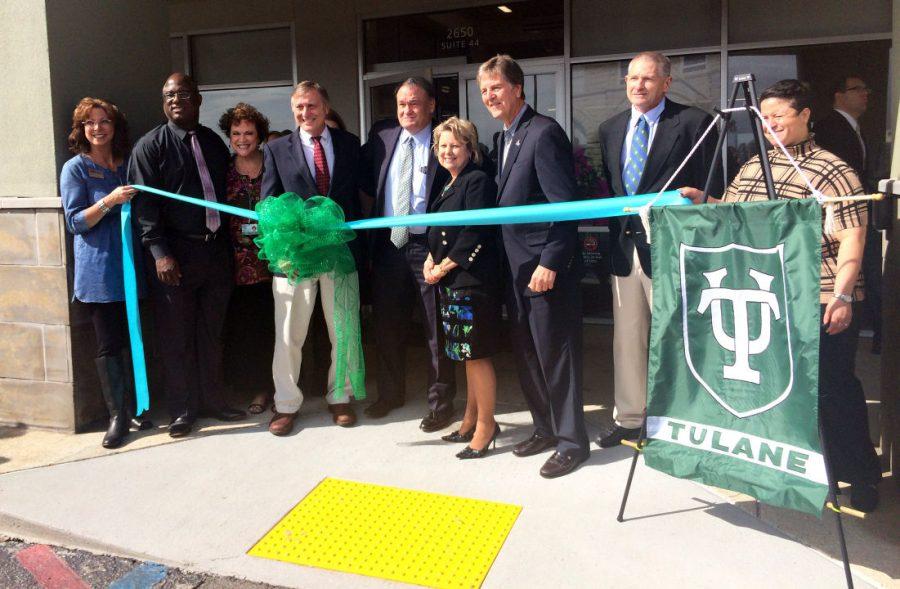Tulane’s new Biloxi campus expands Gulf Coast presence
President Michael Fitts helps cut the ribbon to commemorate Tulane’s new Biloxi, Mississippi campus. Tulane converted a book store into a space for the School of Continuing Studies.
October 28, 2015
On Monday, a bus from New Orleans rolled into Biloxi, Mississippi full of people ready to celebrate the much anticipated ribbon-cutting ceremony for Tulane’s School of Continuing Studies’ new Biloxi campus, which opened this fall.
The $2 million investment now boasts significantly improved working and social spaces, security measures and technology updated from the campus’s previous space that aim to enhance the accessibility, comfort and advancement of the student experience.
“Everyone commented on how gorgeous it was,” Karen Delzell-Lucas, the associate dean for the new Mississippi Coast campus, said. “Tulane was well-represented, but there were other students, faculty [from the School of Continuing Studies] and other visitors here. We had a lot of different people here.”
The School of Continuing Studies at Tulane caters to the learning needs of community members across four Louisiana and Mississippi campuses by offering a variety of degree programs for mostly part-time students, 73 percent of which are over the age of 25.
In 2002, Tulane’s first SCS Biloxi campus was constructed as a space inside the Edgewater Mall. The space had been outgrown, not only with the influx of students but technologically, spurring the move.
In six months, construction on the new building, situated in the former space of a Books-A-Million store at Edgewater Village, across from Biloxi’s Edgewater Mall, was completed relatively seamlessly.
Facilities at the new campus include new computer labs separate from classrooms so students can use them at any time of the day, collapsible walls between classrooms so larger conference rooms can be created, multiple meeting and presentation rooms, and electronic boards for presentations and meetings. The facility’s walls are also plastered with images of historic Tulane, the Huey P. Long Bridge and images of the Uptown campus to help students feel part of the Tulane community.
School of Continuing Studies Dean Richard A. Marksbury explained “the little things” are the campus improvements he is the most enthusiastic about.
“We didn’t have a student lounge before,” Marksbury said. “The students really like the social lounge. We have new computers, it’s well lit, we have a security guard all the time so everybody feels safe when coming in and going out … those are the nice little things.”
Delzell-Lucas emphasizes that most of the students attending the new Biloxi campus are taking evening and nighttime classes, driving the planning team’s priorities of security, community and technology. She and Marksbury agree that the student lounge was the perfect addition to the space.
“[The students] are also looking for social interaction,” said Marksbury. “A lot of students can gather before class, during the break and after class. I think that will promote social interaction and I think that’s a real plus as well.”
Students at Tulane’s Uptown campus also support the School of Continuing Studies’ efforts to expand across the region.
“It offers an opportunity for students who can’t travel,” freshman Madison Basich, said. “Tulane is also a private institution, so I think that opens it up for a lot of other people. It’s good for the school to branch out and spread its name.”
A closed construction site for the new facilities allowed students to experience genuine surprise at the recent unveiling of their new campus.
“No one has expressed anything but absolute thrill about the campus and how it looks and how wonderful it is,” Delzell-Lucas said.
Marksbury, Delzell-Lucas and other project leaders knew they wanted to remain in Biloxi, so their relocation across the street, paired with new facilities, puts them at a strategic advantage for encouraging more student enrollment. Enrollment is currently at an average of 450, from an enrollment of 220 when the campus first opened in 2002.
“We wanted to be in a central location among the coast that was easily accessible,” Delzell-Lucas said. “Since we don’t have food services, we wanted to make sure we had nicer food available for students, we had ample parking, we were in a safe environment and somewhere that could be accessible from most places along the coast in about fifteen minutes. You can see the beach from here!”
The building’s 12-year lease means that Tulane has capitalized on the opportunity to increase their presence along the Gulf Coast, and all involved have expressed their excitement.
“We’re there,” Marksbury said. “We’re committed to that community and we’re gonna be there. After Katrina, we were the first school to open up. Tulane is now integrated and a part of what goes on in the coast.”























Leave a Comment